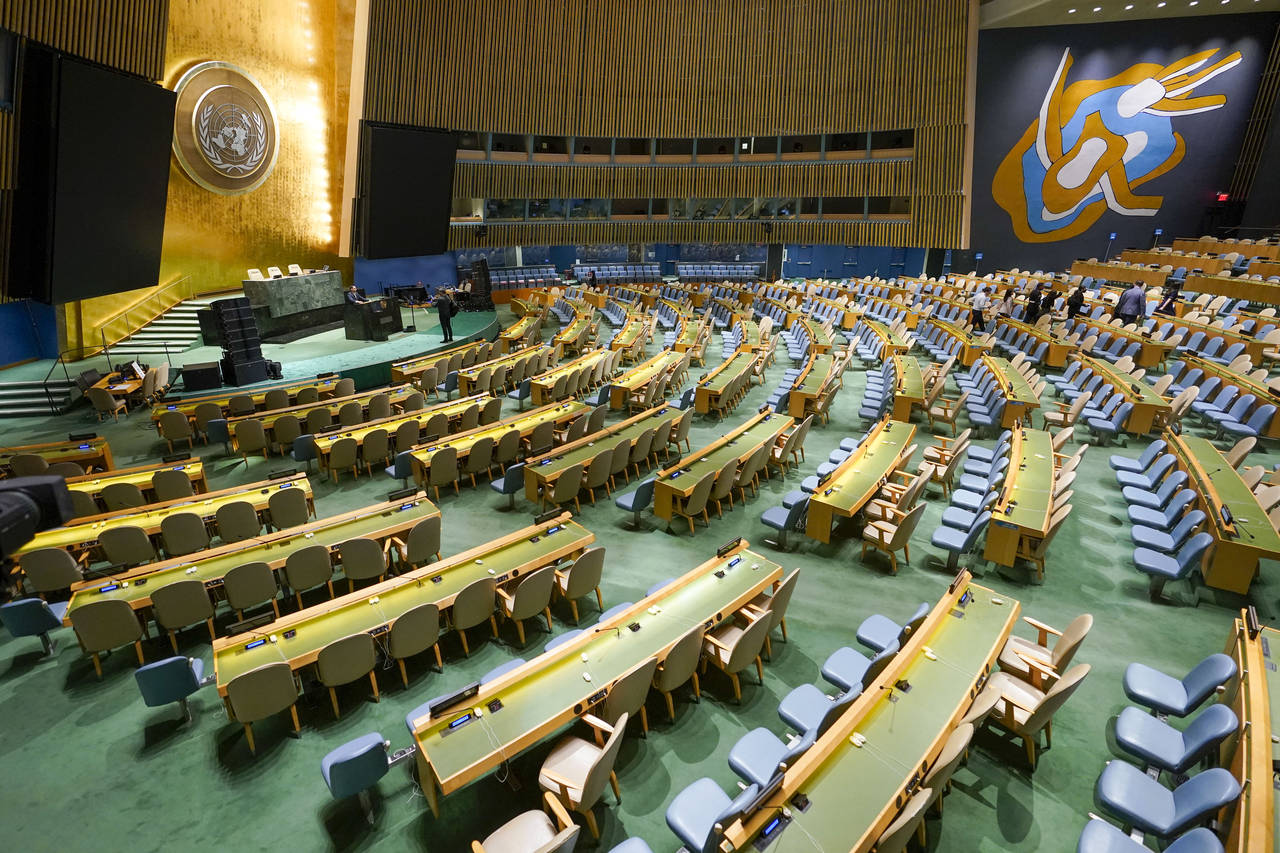EXPLAINER: What to know about the UN General Assembly
Sep 16, 2022, 10:30 PM | Updated: Sep 20, 2022, 5:51 am

Visitors to the United Nations headquarters take photos at the General Assembly speaker's podium ahead of the General Assembly, Friday, Sept. 16, 2022. (AP Photo/Mary Altaffer)
(AP Photo/Mary Altaffer)
UNITED NATIONS (AP) — After two years of virtual and hybrid summits, the world’s leaders are reconvening on the river’s edge in New York this week at the U.N. General Assembly, an exercise in multilateralism born from the hope for lasting peace that followed World War II.
The opening of the 77th session comes as the planet is beset with crises on nearly every front. Russia’s war in Ukraine, inflation and economic instability, terrorism and ideological extremism, environmental degradation and devastating floods, droughts and fires and the ongoing pandemic are just a few of the rampant perils.
The high-level meeting opens Monday with a summit on education, whose thorough disruption during the coronavirus pandemic will reverberate for decades to come. Speeches from the scores of attending leaders begin Tuesday and run through Monday, Sept. 26.
While this year is billed as something of a return to the way things were, certain concessions to the ongoing coronavirus pandemic have been made. In addition to basic health protocols, few side events will take place on the U.N.’s midtown Manhattan campus.
Here’s what to know about this year’s U.N. General Assembly, which will be presided over by Hungary’s Csaba Korösi:
WILL EVERYONE COME TO NEW YORK THIS YEAR?
Yes, mostly. In order to speak at this year’s gathering, leaders or their high-level designees must show up in person — with one notable exception. Ukrainian President Volodymyr Zelenskyy has not left the country since war broke out in late February. The General Assembly voted Friday to allow him to submit a prerecorded speech, expected to air during the latter half of Wednesday’s session.
WHAT IS THE REAL POINT OF ATTENDING THE GENERAL ASSEMBLY?
While the effectiveness of the United Nations has been questioned for as long as it has existed, the benefits of attendance are undeniable. From the dais, countries broadcast their agendas, grievances and calls to action to the entire world and a permanent record. This week is a key chance for countries often drowned out by what they decry as a hegemonic world order to grab the attention of a larger audience. It’s also a chance for leaders — especially those from countries with tensions — to engage in meetings on the sidelines in neutral territory. Those meetings are often called bilaterals, or “bilats.”
HOW LONG ARE SPEECHES ALLOWED TO BE?
They’re supposed to be 15 minutes. Delegates are “kindly reminded” of that on the U.N.’s website, but speeches notoriously tend to run longer. The longest speech made to the General Assembly clocked in at 269 minutes — nearly 18 times that recommendation. It was delivered by Cuba’s Fidel Castro in 1960.
HOW IS THE ORDER OF SPEECHES DETERMINED?
Up first, as a rule: Brazil. It’s tradition. Early on, Brazil volunteered when no other country wanted to speak first. So now the South American country is enshrined as the first speaker. The United States, as the host country, typically speaks second, but President Joe Biden’s attendance of Queen Elizabeth II’s funeral will push his speech to Wednesday this year.
After that, the order is determined by whom a country is sending — heads of state before heads of government before ministers and other representatives — and other criteria, like country preference and geographic balance.
IT’S CALLED A DEBATE, BUT A SUCCESSION OF SPEECHES DOESN’T SOUND VERY LIVELY. WHERE’S THE DRAMA?
The structure of the General Debate doesn’t lend itself to obvious fireworks — no booing or interruptions or immediate rebuttals — but that doesn’t mean intrigue and drama are absent.
First, the speeches can be a font of evocative language and barbs — take Zelenskyy’s speech last year, delivered roughly five months before the war began, in which he castigated the U.N. itself as a “retired superhero” and wryly quoted Russian President Vladimir Putin. Sometimes the message is veiled: While since-ousted Pakistan Prime Minister Imran Khan called India’s Hindu nationalist government “fascist” last year, Indian Prime Minister Narendra Modi targeted both Pakistan and China without mentioning either by name.
Member states are also allowed to exercise the right of reply, in which they can rebut criticism voiced during the General Debate. These are often fiery exchanges but aren’t typically delivered by prominent members of a country’s delegation. India and Pakistan’s longstanding enmity practically guarantees they’ll be using the right of reply.
ARE MEMBER STATES THE ONLY ONES ALLOWED TO ADDRESS THE GENERAL ASSEMBLY?
No. Palestine, Holy See (the Vatican) and the European Union are all permanent observers on the docket this year.
ARE THERE ANY NOTABLE SPEAKERS TO KEEP AN EYE OUT FOR THIS YEAR?
Plenty. In addition to heavy hitters like Biden and Zelenskyy, expect addresses from new British Prime Minister Liz Truss, French President Emmanuel Macron, Iranian President Ebrahim Raisi, Egyptian President Abdel Fattah el-Sissi and new Kenyan President William Ruto, among many others.
Russia is sending its foreign minister, Sergey Lavrov, whose U.S. entry visa was in doubt for some time despite an agreement between the U.N. and the United States that requires the approval of visas “irrespective of the relations existing between the governments of the persons referred to” and the U.S. government.
___
Associated Press chief U.N. correspondent Edith M. Lederer contributed to this report. Follow Mallika Sen on Twitter at https://twitter.com/mallikavsen. For more AP coverage of the U.N. General Assembly, visit https://apnews.com/hub/united-nations-general-assembly.
Copyright © The Associated Press. All rights reserved. This material may not be published, broadcast, rewritten or redistributed.












